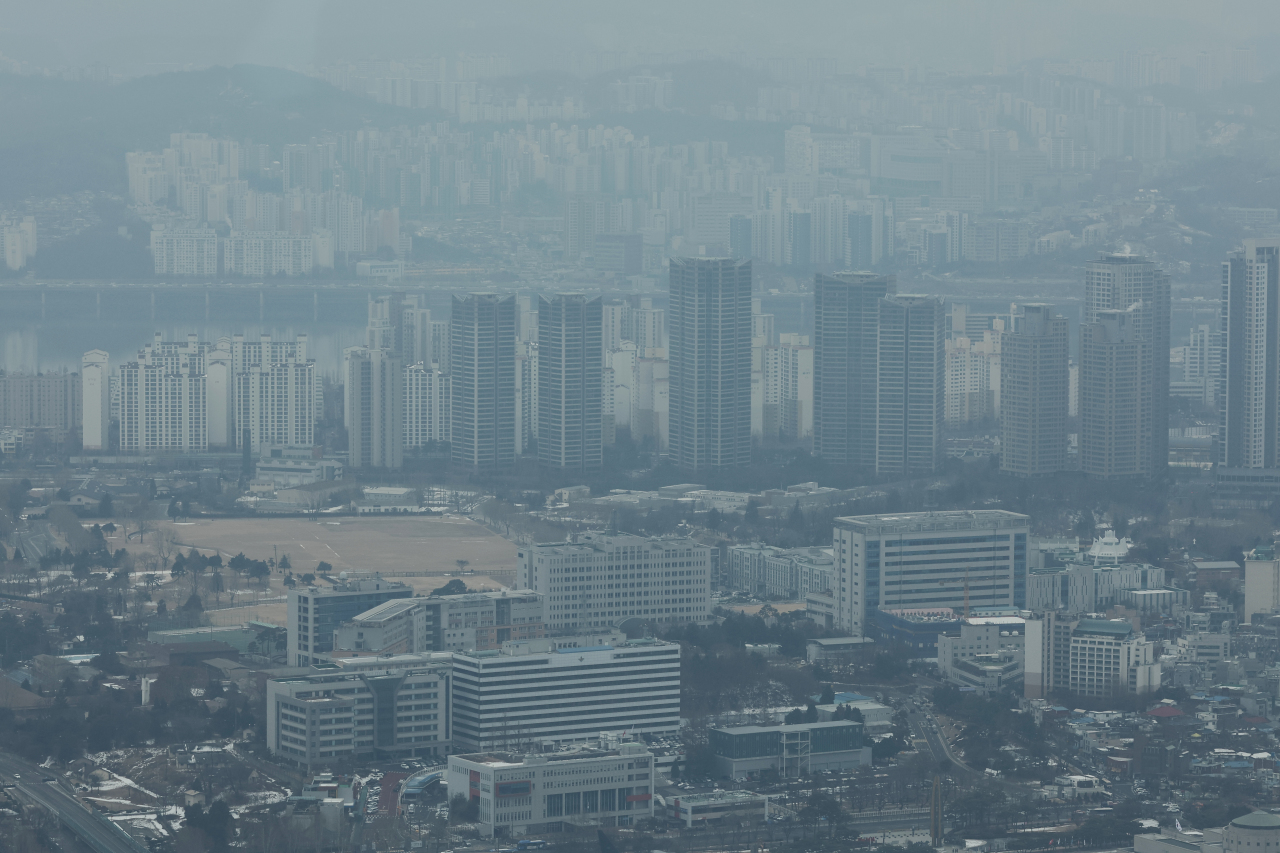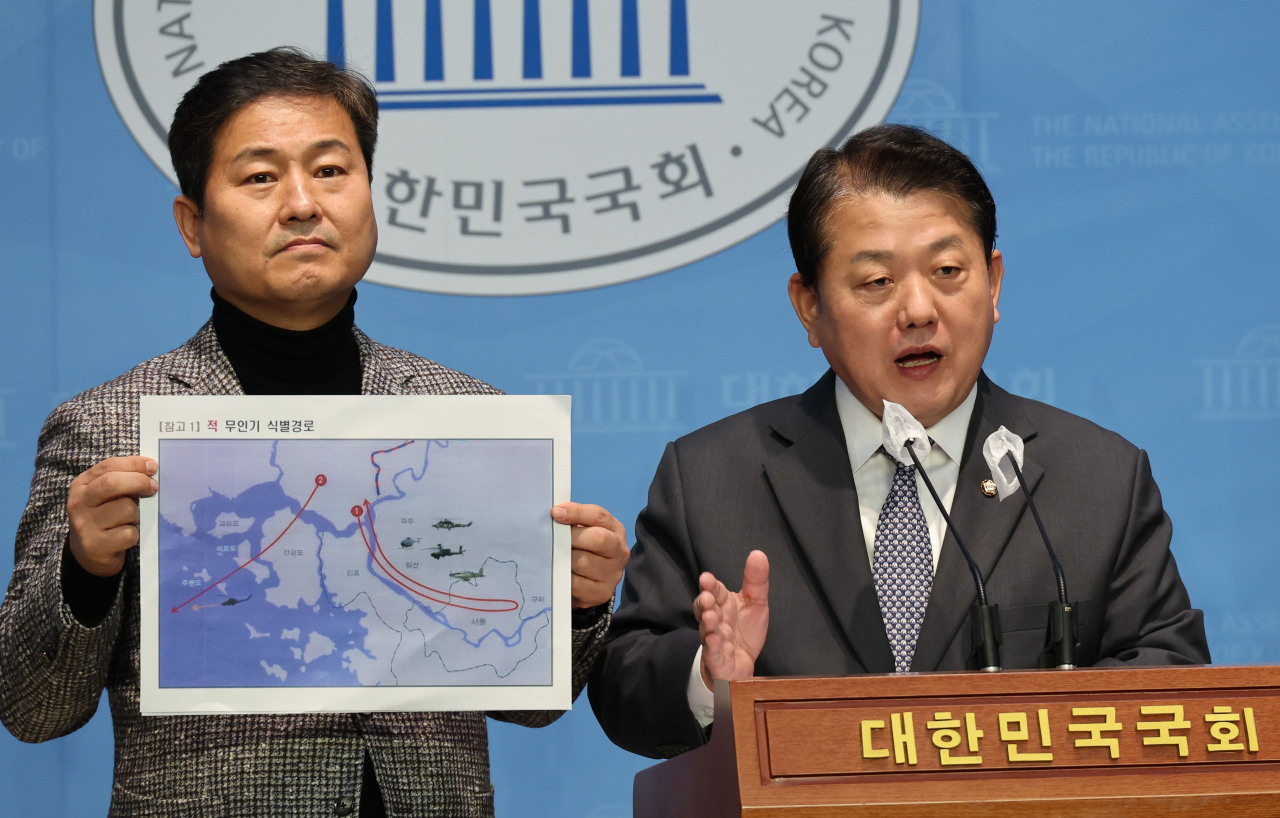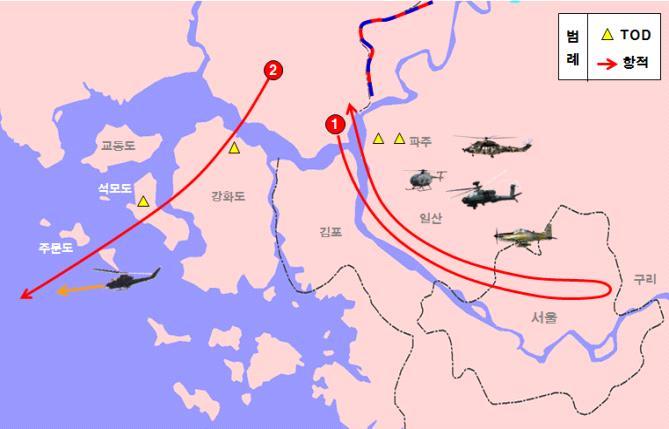 |
This photo, taken from Mount Nam in Seoul on Jan. 5, 2023, shows an area around the presidential office in the capital. A North Korean drone briefly entered a 3.7-kilometer-radius no-fly zone around the office of President Yoon Suk Yeol in Seoul last month, a military official belatedly confirmed the same day, reversing the defense authorities` announcement that there was no such incident. (Yonhap) |
The rebuttal came a day after South Korea’s Joint Chiefs of Staff announced the interim outcome of its ongoing investigation into the intrusion of five North Korean unmanned aerial vehicles, or UAVs, into South Korean airspace on Dec. 26.
The results -- which reversed the military’s previous announcement that North Korean UAVs did not breach any no-fly zones -- have instantly provoked controversy. The no-fly zones, better known as P-73, cover a radius of 3.7 kilometers centered on the new presidential office and residence in Yongsan-gu, Seoul.
The JCS belatedly conceded that one North Korea UAV briefly entered the northern tip of a no-fly zone designated for presidential security, without further details.
During a closed-door briefing on Friday, South Korean senior military officials elucidated that the military had not been aware of the flight trail of one North Korean UAV that entered the northern tip of the no-fly zone designated for presidential security until Jan. 1.
The 20-member team has conducted inspections on the cross-border intrusion of five North Korean UAVs into South Korean airspace since Dec. 27. Later, the JCS concluded on Jan. 3 that there was a high chance that one North Korean UAV passed through the northern end of the no-fly zone upon field inspections of air defense units.
When asked why the military had ruled out the possibility of misjudging the situation, one senior official said the “military is able to conduct operations only when they trust reports from operations officers” of related air defense units. The senior official underscored that the military had no option but to trust the initial assessment made by operations officers.
The military will launch an internal investigation and audit of its failure to bring down any North Korean UAVs that flew over densely populated Seoul and residential areas along the western border, a senior official at the presidential office said on Friday on condition of anonymity. But the Defense Ministry later in the day said no such investigation and audit were currently underway.
 |
Rep. Kim Byung-joo (R) of the main opposition Democratic Party speaks at a news conference on Friday at the National Assembly in western Seoul while Kim Young Bae of the Democratic Party (L) holds an image of a map that shows the identified flight paths of North Korean drones that intruded into South Korea's airspace. (Yonhap) |
Members of the National Assembly’s Defense Committee — who belong to the Democratic Party — called for a public apology from President Yoon Suk Yeol by holding a news conference. The group of lawmakers also announced their plan to push for parliamentary hearings and investigations to get to the bottom of the cross-border infiltration and to hold the Defense Ministry and the JCS accountable.
Speaking at a party meeting, Democratic Party of Korea chair Rep. Lee Jae-myung said the military “lied to the people in addition to their failure of vigilance and operations” to bring down any North Korean UAVs.
“This is an unacceptable gigantic security disaster,” Lee said. “The military leadership should be held accountable accordingly.”
The Democratic Party also denounced the presidential office and the ruling People Power Party for openly accusing Rep. Kim Byung-joo, who is also a retired four-star Army general, of surreptitiously obtaining information on the penetration of the North Korean UAV into the no-fly zone.
 |
A map provided by the Joint Chiefs of Staff to the National Assembly's Defense Committee on Dec. 28 shows the identified flight paths of North Korean drones that intruded into South Korea's airspace. (Yonhap) |
Kim called for the military to re-examine whether the North Korean UAV entered the no-fly zone based on an overlay comparison of a flight trails map provided by the JCS to the National Assembly's defense committee on Dec. 28 with a Google Map of the same dimension.
Rep. Park Hong-keun, the Democratic Party floor leader, on Friday dismissed the presidential office’s calls for disclosing the source of information as a “conspiracy.”
“We will not sit idly by if the Yoon Suk Yeol government and the military continue their conspiracy to hide their lies and suspicions of a cover-up,” Park said at the party meeting.
Kim Byung-joo also refuted the presidential office’s accusation and claimed that his assessment was solely based on his overlap comparison of the JCS’ initial assessment flight trail map with a Google Map in an radio interview with MBC on Friday.
“Any Seoul citizen who can read a map could figure it out,” Kim said.
But one senior military official refuted Kim’s claim, and said the military was unable to understand how Kim could swiftly figure out the penetration through the map during the closed-door briefing on Friday.
The official said the JCS indicated the flight trails of the North Korean UAVs were based on the military’s erroneous initial assessment, which concluded that the trails were outside of the no-fly zones in Seoul.
“Some claim that the map (based on the initial assessment) shows a violation of the no-fly zone, but we don’t agree,” an unnamed senior official told reporters on condition of anonymity. “We mark the flight trails precisely in light of the significance (of the flight trails in military operations).”
The ruling People Power Party leaders also urged Kim to reveal how he identified the North Korean UAV’s breach of the no-fly zone within 30 minutes during a party meeting on Friday morning.
The ruling party also shifted the blame for the cross-border infiltration of North Korea UAVs to the Moon Jae-in government and the main opposition Democratic Party.
Rep. Kim Seok-ki, Secretary-General of the People Power Party, “has already attempted to politicize” the infiltration of North Korean UAVs.
“It is truly shameful that the Democratic Party — which is responsible for causing North Korea to run wild — has raised the issue of the Yoon Suk Yeol government’s national security posture against North Korea and launching a political offensive …” Kim said.
People Power Party floor leader Joo Ho-young said the Moon Jae-in government “bears most of the responsibility” for the military’s lack of preparedness given that it takes several years for the military to build up systems and come up with measures to counter North Korean UAVs.
“The first thing the Democratic Party should do is to apologize for destroying and undermining national security,” Rep. Sung Il-jong of the People Power Party said during the party meeting.







![[Today’s K-pop] Blackpink’s Jennie, Lisa invited to Coachella as solo acts](http://res.heraldm.com/phpwas/restmb_idxmake.php?idx=644&simg=/content/image/2024/11/21/20241121050099_0.jpg)